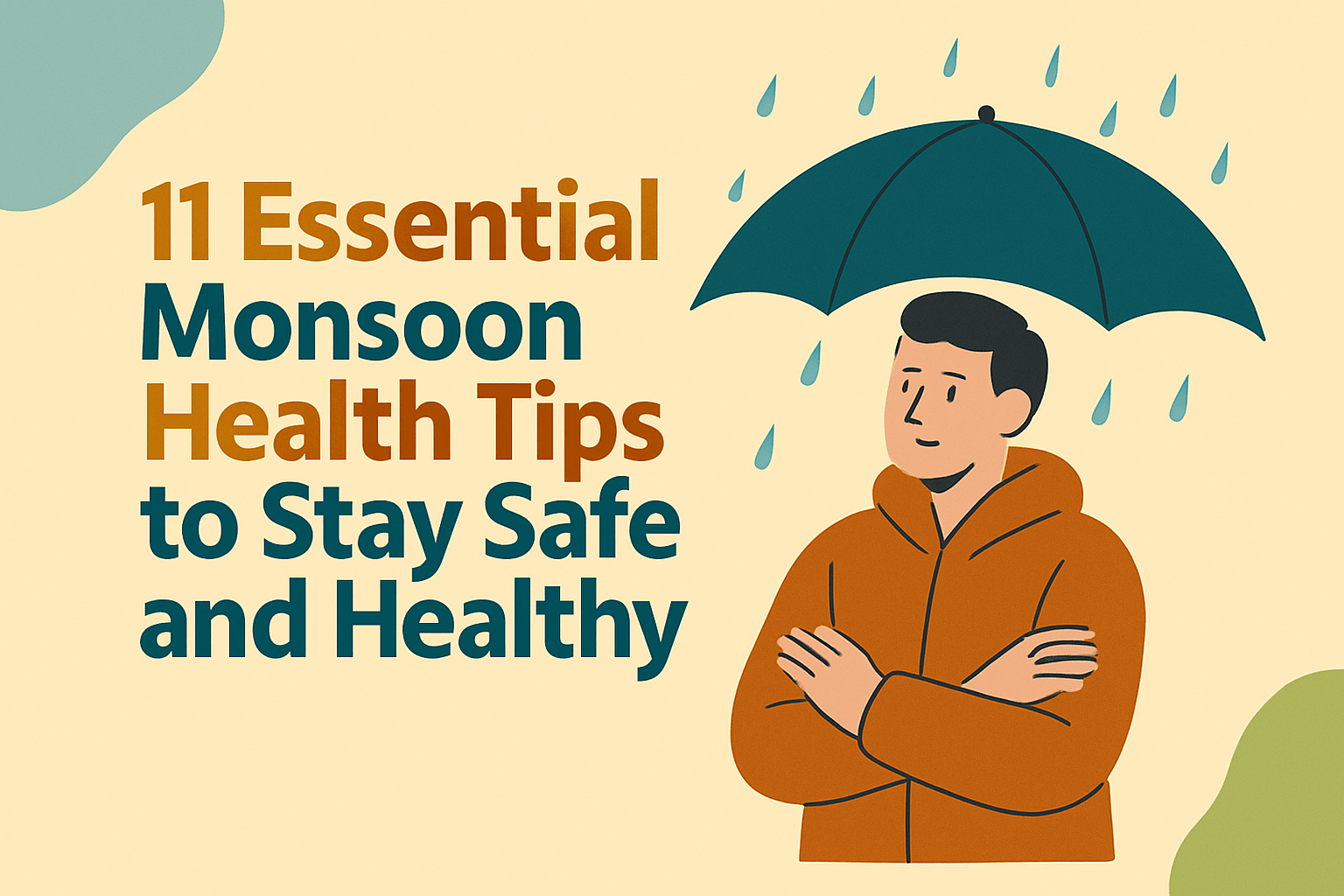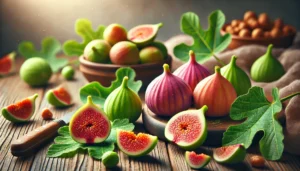The monsoon season brings much-needed relief from the scorching summer heat with cool breezes, refreshing rains and lush greenery. However, this season also invites a host of health problems—viral infections, digestive issues, skin allergies and mosquito-borne diseases rise sharply. That’s why it’s important to be cautious and prepared. In this article, we share 11 essential monsoon health tips that will help you enjoy the rains without compromising your well being.
Whether you are a student, a working professional or a parent looking out for your family, these health tips for rainy season will help you stay safe and healthy.
1. Drink Clean and Boiled Water
During monsoons, waterborne diseases become a major concern. Rainwater can mix with sewage and contaminate drinking sources, leading to illnesses like typhoid, cholera, and jaundice. That’s why drinking clean, safe water is absolutely essential.
Always boil your water before drinking or use a reliable water purifier at home. If you are stepping out, carry your own bottle of filtered water to avoid drinking from unknown sources. It might seem like a small step, but it’s one of the most basic and powerful monsoon health tips to avoid dangerous infections caused by contaminated water.
2. Strengthen Your Immunity with Seasonal Foods
The rainy season weakens your immune system, making you more likely to catch colds, flu, and infections. That’s why building immunity should be your top priority during this time. Focus on eating fresh, seasonal fruits like apples, pears, and pomegranates. They are full of vitamins, fiber, and antioxidants.
Also, include natural immune boosters like turmeric, ginger, garlic, and tulsi (holy basil) in your daily meals. You can make simple herbal teas using these ingredients. A cup of warm tea with honey and ginger not only soothes your throat but also protects you from seasonal illnesses. This is one of the must-follow health tips for rainy season for both children and adults.
Also Read: 10 Simple Ways to Boost Immune System Naturally
3. Avoid Street Food and Oily Snacks
Rainy days make you crave hot and spicy snacks, but street food during monsoon can be risky. Due to moisture and unhygienic handling, street vendors’ food often becomes a breeding ground for germs and bacteria. Oily and fried snacks also take longer to digest in this weather, which can upset your stomach.
Instead of fried food, switch to light, home-cooked snacks like roasted makhana, steamed idlis, or baked corn. These are easier to digest and much safer to consume. This simple change in your eating habit supports one of the golden monsoon health tips—eat fresh, clean, and light food to stay fit.
4. Wear Breathable and Dry Clothes
Wearing the right clothes during monsoon is more important than most people think. Wet or damp clothes can cause skin irritation and fungal infections, especially around your feet, underarms, and private areas. That’s why choosing breathable fabrics like cotton or linen is key.
Always change out of wet clothes immediately and avoid staying in sweaty outfits. Make sure to dry your clothes completely before wearing them again. Maintaining good hygiene through your clothing is one of the most practical monsoon health tips, especially if you have sensitive skin or live in a humid area.
5. Protect Yourself from Mosquitoes
Monsoons bring standing water, and that becomes the perfect breeding ground for mosquitoes. Diseases like dengue, malaria, and chikungunya are commonly spread during this season and can become serious if not prevented.
Use mosquito repellents, plug-in machines, or herbal sprays inside your home. When going outside, wear long-sleeved clothes to protect your arms and legs. Burning neem leaves or using citronella oil are also excellent natural repellents. Among all the monsoon health tips, this one is absolutely crucial—don’t give mosquitoes a chance to bite.
6. Wash Fruits and Vegetables Thoroughly
Fresh produce, especially leafy greens and fruits, tends to carry more dirt and bacteria during the rainy season. Unwashed or improperly cleaned vegetables can lead to stomach infections and food poisoning.
Always wash fruits and vegetables under running water, and soak them in a water-vinegar solution for 15–20 minutes before cooking or eating. Pay extra attention to green vegetables, as they are more prone to fungal contamination. Keeping your food clean is one of the most effective health tips for rainy season that protects your whole family.
7. Keep Your Surroundings Dry and Clean
Wet corners, damp walls, and stagnant puddles in or around your home can attract mold, insects, and harmful bacteria. These not only create an unhealthy environment but also increase the chances of respiratory allergies and infections.
Make sure your home is well-ventilated and dry. Fix any leaks and clean wet floors quickly. Use disinfectant liquids while mopping to reduce germs. Clearing puddles around your home also stops mosquito breeding. Clean surroundings go hand-in-hand with strong health, and this is one of the most overlooked but effective monsoon health tips.
8. Practice Good Hand Hygiene
The rainy season is when germs spread the fastest, especially through unclean hands. Coughs, colds, flu, and stomach infections are often passed on by touching contaminated surfaces and then touching your face or food.
Washing your hands properly with soap and water before eating or after coming from outside is a small habit that goes a long way. Keep a pocket-sized sanitizer with you when you’re traveling. Among all the monsoon health tips, this one is simple but extremely powerful for avoiding common seasonal diseases.
9. Keep Your Feet Dry
Walking through waterlogged roads during monsoon is often unavoidable, but wet feet can lead to fungal infections, bad odor, and even athlete’s foot. The skin between your toes is especially vulnerable.
When you get home, wash and dry your feet thoroughly, especially between the toes. Avoid wearing tight or closed shoes that trap moisture. Use talcum powder or antifungal powder to keep your feet dry. This may sound like a small tip, but it’s one of those monsoon health tips that truly improves your comfort and prevents skin issues.
10. Take Steam and Stay Warm
Frequent colds, coughs, and throat infections are more common during this time due to fluctuating temperatures and dampness. Steam inhalation is one of the oldest and most effective remedies for blocked noses and throat congestion.
Add a few drops of eucalyptus oil or tulsi leaves to hot water and inhale the steam for 5–10 minutes. It opens up your airways and helps you breathe better. After getting wet in the rain, always dry off quickly and wear warm clothes. Staying warm is one of those traditional monsoon health tips that still works like a charm.
11. Exercise Indoors to Stay Active
Rainy weather often puts a stop to morning walks or outdoor workouts. But lack of exercise weakens your immunity and makes you feel lazy. That’s why it’s important to stay physically active even during monsoons.
You can do yoga, stretching, or light cardio exercises indoors. Even a 20-minute home workout can keep your body fit and your mood uplifted. Staying active boosts metabolism, improves blood circulation, and supports overall well-being. This is one of the lesser-discussed yet important monsoon health tips to keep your body and mind in top shape.
Conclusion
The monsoon is a beautiful season but it also demands extra care when it comes to your health. By following these essential monsoon health tips you can enjoy the rain without falling sick. From drinking clean water and boosting immunity to avoiding dampness and mosquito bites, these practices help you stay healthy and protected.
Incorporate these health tips for rainy season into your daily routine and share them with your family and friends. Staying informed and cautious during the monsoon can go a long way in avoiding preventable illnesses.
Frequently Asked Questions
1. What are the most important monsoon health tips for children?
Children are more vulnerable during the monsoon. Ensure they drink only boiled or filtered water, avoid playing in puddles, eat home-cooked meals, and wear dry, comfortable clothing to prevent infections and colds.
2. Why do we fall sick more often during the rainy season?
The rainy season promotes the growth of bacteria, viruses, and fungi due to increased moisture. This weakens the immune system and leads to a rise in infections like cold, flu, stomach infections, and skin problems.
3. What should we avoid eating during the monsoon?
Avoid raw leafy vegetables, cut fruits sold outside, oily street food, and unpasteurized dairy. These items can harbor bacteria and upset the digestive system.
4. How can we prevent mosquito-borne diseases in monsoon?
Use mosquito repellents, sleep under mosquito nets, wear full-sleeved clothes, and avoid water stagnation near your home. Keeping your surroundings clean is key.
5. What are simple home remedies for common monsoon illnesses?
For colds and coughs, drink tulsi and ginger tea. For indigestion, try warm water with a pinch of rock salt and ajwain (carom seeds). Steam inhalation with eucalyptus oil helps with nasal congestion.




